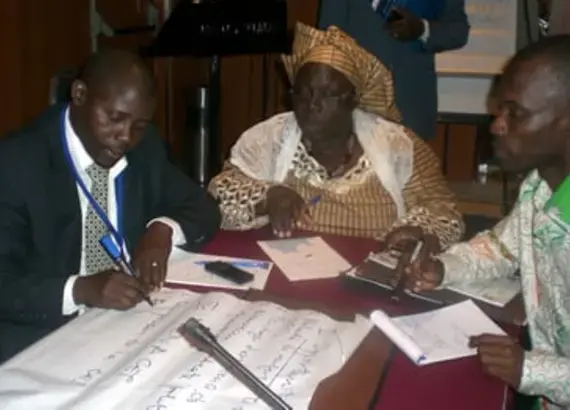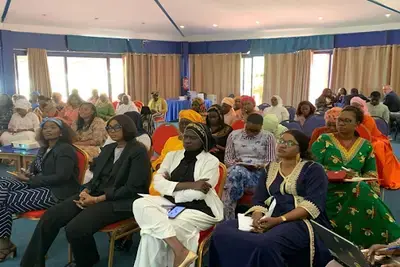
Success Story
Citizen Election Observation Groups in Cote d’Ivoire Work to Reduce Electoral Violence
Six citizen election observer groups in Côte d’Ivoire have agreed to coordinate their efforts during upcoming legislative elections, marking the first time there has been such cooperation in the West African country. The decision emerged from a conference held last month in Abidjan on the impact of election observation in diminishing election-related violence.
During the presidential elections of November 2010, observers faced a number of challenges. Delayed funding left citizen groups without the time needed to properly recruit, train and deploy observers. Subsequently, the presence of multiple, uncoordinated groups led to the release of statements with contradictory conclusions. Many Ivorians complained that such confusion hurt election observers’ credibility with the public, contributing to a post-election conflict that left more than 3,000 people dead and one million displaced.
Responding to feedback from Ivorians, and drawing from best practices from other countries, NDI and its partners determined that a more coordinated approach would reduce the risk of contradictory statements, increase observers’ credibility, and enhance public confidence in the results, thereby reducing the risk of future violence. Participants also agreed that for their monitoring efforts to be credible, they had to be impartial and professional citizen observers.
“In the past, people only respected international election observers. That is changing, and now people respect national citizen observers more.”
- Christopher Fomunyoh, NDI Central and West Africa director
To avert future crises, especially as Côte d’Ivoire prepares for legislative elections set for December 2011, participants at the Aug. 10-12 conference discussed the role of citizen groups in monitoring and mitigating political violence in other countries and how to apply those lessons to Côte d’Ivoire.
“In the past, people only respected international election observers,” said Christopher Fomunyoh, NDI Central and West Africa director. “That is changing, and now people respect national citizen observers more. Domestic election observation has become a prerequisite for credible elections.”
“There is a proverb that states that 10 people who speak make more noise than 10,000 who are silent,” said Makram Ouaiss, a Lebanon-based conflict mitigation and elections expert and one of the leaders of the conference. “Therefore, citizen observer groups need to speak up about what they witness.”
Ouaiss was joined by conflict experts D.M. Dissanayake of the Committee for Monitoring Election Violence (CMEV) of Sri Lanka and Stephen Kirimi of Peacenet Kenya. The West Africa Election Observers Network (WAEON) also sent regional experts to the event: Mashood Erubami, president of WAEON and chairman of the Transition Monitoring Group of Nigeria, Dansa Kourouma of Reseau Afrique Jeunesse (RAJ—Gui) of Guinea, and Francis Oppong of the Center for Democratic Development in Ghana.
These experts presented case studies from their respective countries and led exercises on innovations in violence monitoring techniques such as mapping, SMS text messaging to report violence, citizen mediation efforts and the use of Facebook and other social media to name and shame perpetrators of violence. Dissanayake explained how CMEV deploys observers to monitor all phases of an election — including the pre-election and post-election periods — and conducts voter education campaigns using billboards and posters to urge citizens to vote peacefully. CMEV also maps incidents of violence, with observer reports presenting regular updates. Dissanayake also shared information with Ivorian participants on free mapping tools available on the Internet.
Kirimi explained the advantages of regular communication with government agencies, especially the police. He also explained that because Ivorian civil society organizations can’t stop acts of violence reported by citizen observers, Ivorian organizations should develop strong relationships with law enforcement agencies so they can respond quickly to reports of violence. Kirimi’s organization, Peacenet in Kenya, trains police on how to monitor and respond to electoral violence.
“I really enjoyed hearing about observation efforts in other countries,” said Marie-Paule Kodjo, national coordinator of the Coalition of Ivorian Women for Elections and Post-Crisis Reconstruction. “It gives me ideas of how we can improve election observation in Cote d’Ivoire.”
At the close of the forum, participants developed a number of recommendations, agreeing to:
- Establish a working group that brings together all civil society organizations involved in election observation;
- Establish another working group that brings together actors involved in the electoral process, including government agencies, political parties and the media;
- Provide additional training to observers, polling station workers, party pollwatchers and electoral judges;
- Advocate to reduce conflicting cleavages within Ivorian society in order to contribute to national reconciliation; and
- Conduct long-term observation that covers all stages of the electoral process.
The conference was sponsored by a partnership comprising a broad coalition of Ivorian civil society organizations, the Global Network of Domestic Election Monitors (GNDEM), the West Africa Election Observers Network (WAEON) and NDI.
Related:
Published Sept. 8, 2011



